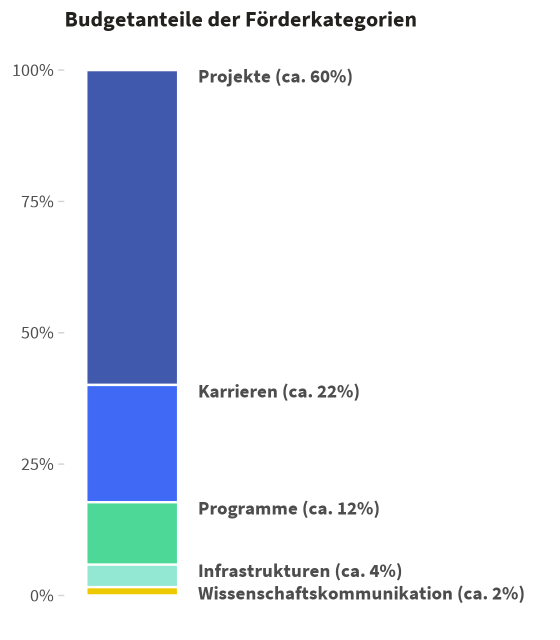Action Plan 2021-2024

We invest in researchers and their ideas
Switzerland is a global leader in research and innovation. Our success is the result of consistent policies that prioritise education, research and innovation (ERI). Switzerland's international reputation in this area is excellent.
The Swiss National Science Foundation (SNSF) supports scientific research in all academic disciplines. We select and fund the best research projects and early-career researchers at national level based on competition. The knowledge generated in such projects provides a sound basis for economic and societal progress.
Our aim is to help create optimal conditions for Swiss researchers also during the
ERI period. This will put them on a strong footing to tackle current challenges, such as climate change or pandemics, and keep Swiss science fit to fight unexpected problems in the future. We have set ourselves a number of goals: to create more diversity in research; to bring research and innovation closer together; to enhance the benefits of research results for the economic and political sectors as well as for society as a whole.
The Swiss Parliament has approved a budget of 4.6 billion francs for the upcoming funding period, which we will use to implement our multi-year programme. This Action Plan gives an overview of the allocation of funds and of the new measures to be implemented.
Priorities 2021-2024
Research and its context are constantly evolving. In view of the current challenges, the SNSF has defined four priorities for the
period. Our aim is to continue to offer optimal conditions for creative research, so that it can fulfil its potential in the future.Enhancing excellence through diversity
All researchers and all ideas should benefit from equal opportunities for funding - this will strengthen Switzerland's position as a world-leading research hub in the long term. The SNSF aims to achieve this goal by:
- improving the assessment of the qualifications and achievements of researchers;
- introducing quotas for women in the evaluation bodies of the SNSF;
- offering new funding options for women at doctoral level in STEM;
- introducing temporary measures in the health sciences for universities of applied sciences;
- continuing the pilot projects Spark and Practice-to-Science once their respective pilot phases have been evaluated.
Strengthening international leadership through cooperation
On the one hand, research is global. But, on the other hand, it is becoming increasingly more specialised. Many topics cannot be addressed without a number of groups with complementary skills working together. The SNSF wants to make it easer for researchers to collaborate on the development of new fields and at the same time enhance Switzerland's international standing. This we aim to achieve by:
- making existing schemes more flexible and creating incentives that will lead to more collaborative projects being submitted and funded on a wide range of topics.
Supporting data infrastructures and services for open science
Researchers produce, store, manage and analyse ever-increasing amounts of data. We want to make sure that they can rely on high-quality data infrastructures and services that are well-coordinated and easy to access. This is crucial for obtaining high-quality, reusable research and accelerates the transition to open science. In the
period, the SNSF on behalf of the SERI will therefore:- finance the Swiss Centre of Expertise in Social Sciences (FORS), the Data and Service Centre for the Humanities (DaSCH), the Swiss HIV Cohort Study (SHCS) and the Swiss Transplantation Cohort Study (STCS).
Making research more beneficial to society
The findings of researchers working under SNSF grants should be made available as soon as possible in suitable form. They inform political decisions and provide a basis for the development of products and services. The following measures will bring us closer to this goal:
- launching implementation networks which bring researchers together with potential users of research results, thereby facilitating their application.
- enabling all disciplines to participate in BRIDGE, the joint programme launched by Innosuisse and the SNSF, and considering the sustainable impact of each project under evaluation on the economy, society and the environment.
- Continuing our efforts to ensure that all scientific publications resulting from SNSF-funded projects can be accessed freely and used as flexibly as possible all over the world (open access).
- Ensuring that researchers in Switzerland can access research data with ease and promoting their reuse (open research data).
Evidence-based funding policy
The SNSF is convinced that research funding policies should be informed by research on research. We frequently contribute to this knowledge base through specific studies. For example, pilot projects to test innovations and analyse our own activities - in close collaboration with researchers. Internal analyses are complemented by independent external evaluations.
In career funding, the SNSF launched a cohort study in 2018. Our aim is to trace the professional development of applicants at postdoctoral level and learn more about the medium to long-term effects of our funding. In 2019, we tested alternative procedures within the Postdoc.Mobility funding scheme. This included drawing by lots in cases where proposals of equally high quality could not be further differentiated. In the SciCV project, we tested an online tool in which applicants uniformly entered their CVs in accordance with the DORA recommendations.
In the
period, we will continue doing research on research. For example, together with Innosuisse we will be conducting a study on start-ups created on the basis of scientific results. We will also be examining whether the output of SNSF-funded researchers differs from that of other researchers.The SNSF funding schemes 2021-2024

The SNSF continues to invest the lion's share of its budget - approximately 80% - in open funding formats with few thematic or other requirements. This enables researchers to pursue and develop their own ideas and priorities.
Projects
Project funding is and will remain the backbone of the SNSF’s funding portfolio. Project funding grants enable researchers to implement their ideas and projects.
The SNSF uses the Sinergia programme to fund relatively small-sized projects involving interdisciplinary collaboration between two to four groups of researchers who aim to achieve a scientific breakthrough.
The Spark pilot programme allows rapid testing and development of new scientific approaches, methods, theories, standards and ideas.
- Within project funding and Sinergia, we are improving funding opportunities for collaborative research.
- Should the Spark pilot programme generate positive results, it will be continued in 2022.
- As of 2023, the SNSF will implement temporary measures in the health sciences to support universities of applied sciences.
Careers
Eccellenza enables highly qualified early-career researchers to build a research team and improve their qualifications with a view to obtaining a permanent professorship at a higher education institution.
The SNSF awards Practice-to-Science grants to qualified experts with proven practical experience who wish to join a university of applied sciences or a university of teacher education as a professor, and to newly appointed professors at a university of applied sciences or a university of teacher education who wish to strengthen the academic component of their dual scientific-practical skill profile.
Ambizione allows young researchers to become more independent and build a scientific profile through a sizeable project of their own.
PRIMA allows excellent women researchers to qualify for a permanent professorship and contributes to increasing the share of professorships held by women in Switzerland.
Mobility fellowships enable doctoral and postdoctoral researchers to gain more in-depth knowledge at a higher education institution abroad.
Doc.CH offers grants to doctoral students in the humanities and social sciences.
- If the results of the pilot programme are deemed to be positive following the second call in 2021, the Practice-to-Science scheme will be continued in 2023.
- The SNSF will also provide new funding options for women in STEM disciplines at doctoral level.
Programmes
The National Centres of Competence in Research (NCCRs) finance research on strategically important issues. Several research institutions participate in a single NCCR. The aim is to create competencies and structures that are sustainable.
The knowledge generated by the National Research Programmes (NRPs) contributes to the search for solutions to today's most pressing problems.
With the special programme Investigator Initiated Clinical Trials (IICT) in biology and medicine, the SNSF promotes clinical studies on under-researched topics that do not attract industry interest.
International and bilateral programmes strengthen Switzerland's role in international scientific cooperation.
The BRIDGE programme launched by Innosuisse and the SNSF supports use-inspired projects at the interface of basic science and science-based innovation.
- In this period BRIDGE will be expanded to cover all disciplines, including the humanities and social sciences. The programme will support more projects than before.
Infrastructures
FLARE (Funding Large International Research projects) was launched under a special mandate from the SERI. As a funding scheme it aims to facilitate the development, construction, maintenance and operation of research infrastructures for major international experiments in particle physics, astrophysics and astroparticle physics.
Through R’Equip, the SNSF awards grants for the acquisition and development of large-scale apparatuses in all areas of science.
- On behalf of the SERI, the SNSF funds and evaluates data infrastructures and services (DIS) of national importance as part of its infrastructure portfolio. This includes funding for the Swiss Centre of Expertise in Social Sciences (FORS), the Data and Service Centre for the Humanities (DaSCH) and two biomedical cohorts.
Science communication
The Agora scheme encourages researchers to communicate with a lay audience about their current research.
The Scientific Exchanges scheme enables researchers to host their own scientific event in Switzerland and invite colleagues from abroad, or to visit colleagues in another country.
- The SNSF now also promotes implementation networks. They connect researchers with potential users of research results, thereby facilitating their application.
2021-2024 budget of the SNSF
in millions of francs
2021
2022
2023
2024
Projects, careers, programmes, infrastructure, science communication, service provision
988,8
1001,8
1029,1
1058,6
4078,4
Indirect costs of research institutions (overhead) and supplementary tasks
119,0
135,5
138,4
143,8
536,7
Total
1107,8
1137,3
1167,5
1202,4
4615,0
What we also wanted to fund
Federal funds are limited. Not all necessary and useful research funding initiatives can be financed with the budget available for the
period. Through cuts and transfers from existing schemes, the SNSF sought to ringfence enough funds for specific measures. In spite of this, several measures that were originally planned have had to be shelved. For example:- No start-up and development grants for emerging data infrastructure requirements. The SNSF will focus on funding for existing schemes as well as for FORS and DaSCH.
- No new funding scheme for medium-sized consortia to develop new research fields and enhance international positioning. Instead, we will channel more resources into collaborative research within existing schemes.
- No salary adjustments for project staff in line with increases in nominal wages.
- No calls for new editions in the humanities or for new cohort studies in medicine.
- No calls in the engineering sciences for universities of applied sciences.